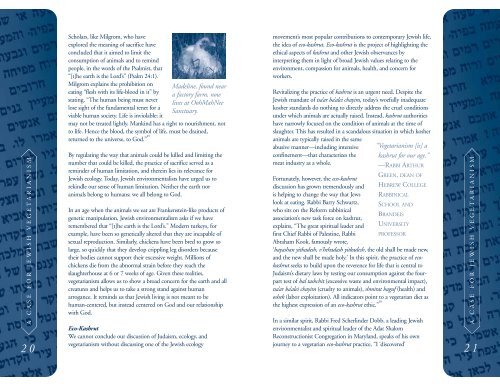JEWISH
A Case for Jewish Vegetarianism - All Creatures
A Case for Jewish Vegetarianism - All Creatures
- No tags were found...
You also want an ePaper? Increase the reach of your titles
YUMPU automatically turns print PDFs into web optimized ePapers that Google loves.
A CASE FOR <strong>JEWISH</strong> VEGETARIANISM<br />
20<br />
Scholars, like Milgrom, who have<br />
explored the meaning of sacrifice have<br />
concluded that it aimed to limit the<br />
consumption of animals and to remind<br />
people, in the words of the Psalmist, that<br />
“[t]he earth is the Lord’s” (Psalm 24:1).<br />
Milgrom explains the prohibition on<br />
eating “flesh with its life-blood in it” by<br />
stating, “The human being must never<br />
lose sight of the fundamental tenet for a<br />
viable human society. Life is inviolable; it<br />
Madeline, found near<br />
a factory farm, now<br />
lives at OohMahNee<br />
Sanctuary.<br />
may not be treated lightly. Mankind has a right to nourishment, not<br />
to life. Hence the blood, the symbol of life, must be drained,<br />
returned to the universe, to God.” 49<br />
By regulating the way that animals could be killed and limiting the<br />
number that could be killed, the practice of sacrifice served as a<br />
reminder of human limitation, and therein lies its relevance for<br />
Jewish ecology. Today, Jewish environmentalists have urged us to<br />
rekindle our sense of human limitation. Neither the earth nor<br />
animals belong to humans; we all belong to God.<br />
In an age when the animals we eat are Frankenstein-like products of<br />
genetic manipulation, Jewish environmentalism asks if we have<br />
remembered that “[t]he earth is the Lord’s.” Modern turkeys, for<br />
example, have been so genetically altered that they are incapable of<br />
sexual reproduction. Similarly, chickens have been bred to grow so<br />
large, so quickly that they develop crippling leg disorders because<br />
their bodies cannot support their excessive weight. Millions of<br />
chickens die from the abnormal strain before they reach the<br />
slaughterhouse at 6 or 7 weeks of age. Given these realities,<br />
vegetarianism allows us to show a broad concern for the earth and all<br />
creatures and helps us to take a strong stand against human<br />
arrogance. It reminds us that Jewish living is not meant to be<br />
human-centered, but instead centered on God and our relationship<br />
with God.<br />
Eco-Kashrut<br />
We cannot conclude our discussion of Judaism, ecology, and<br />
vegetarianism without discussing one of the Jewish ecology<br />
movement’s most popular contributions to contemporary Jewish life,<br />
the idea of eco-kashrut. Eco-kashrut is the project of highlighting the<br />
ethical aspects of kashrut and other Jewish observances by<br />
interpreting them in light of broad Jewish values relating to the<br />
environment, compassion for animals, health, and concern for<br />
workers.<br />
Revitalizing the practice of kashrut is an urgent need. Despite the<br />
Jewish mandate of tsa’ar ba’alei chayim, today’s woefully inadequate<br />
kosher standards do nothing to directly address the cruel conditions<br />
under which animals are actually raised. Instead, kashrut authorities<br />
have narrowly focused on the condition of animals at the time of<br />
slaughter. This has resulted in a scandalous situation in which kosher<br />
animals are typically raised in the same<br />
abusive manner—including intensive<br />
confinement—that characterizes the<br />
meat industry as a whole.<br />
“Vegetarianism [is] a<br />
kashrut for our age.”<br />
—RABBI ARTHUR<br />
GREEN, DEAN OF<br />
Fortunately, however, the eco-kashrut<br />
discussion has grown tremendously and HEBREW COLLEGE<br />
is helping to change the way that Jews RABBINICAL<br />
look at eating. Rabbi Barry Schwartz, SCHOOL AND<br />
who sits on the Reform rabbinical<br />
BRANDEIS<br />
association’s new task force on kashrut,<br />
explains, “The great spiritual leader and UNIVERSITY<br />
first Chief Rabbi of Palestine, Rabbi PROFESSOR<br />
Abraham Kook, famously wrote,<br />
‘hayashan yithadesh, v'hehadash yitkadesh, the old shall be made new,<br />
and the new shall be made holy.’ In this spirit, the practice of ecokashrut<br />
seeks to build upon the reverence for life that is central to<br />
Judaism’s dietary laws by testing our consumption against the fourpart<br />
test of bal tashchit (excessive waste and environmental impact),<br />
tsa’ar ba’alei chayim (cruelty to animals), shmirat haguf (health) and<br />
oshek (labor exploitation). All indicators point to a vegetarian diet as<br />
the highest expression of an eco-kashrut ethic.” 50<br />
In a similar spirit, Rabbi Fred Scherlinder Dobb, a leading Jewish<br />
environmentalist and spiritual leader of the Adat Shalom<br />
Reconstructionist Congregation in Maryland, speaks of his own<br />
journey to a vegetarian eco-kashrut practice, “I ‘discovered’<br />
A CASE FOR <strong>JEWISH</strong> VEGETARIANISM<br />
21


